
EvoMaster
The first open-source AI-driven tool for automatically generating system-level test cases (also known as fuzzing) for web/enterprise applications. Currently targeting whitebox and blackbox testing of Web APIs, like REST, GraphQL and RPC (e.g., gRPC and Thrift).
Stars: 443

EvoMaster is an open-source AI-driven tool that automatically generates system-level test cases for web/enterprise applications. It uses Evolutionary Algorithm and Dynamic Program Analysis to evolve test cases, maximizing code coverage and fault detection. It supports REST, GraphQL, and RPC APIs, with whitebox testing for JVM-compiled APIs. The tool generates JUnit tests in Java or Kotlin, focusing on fault detection, self-contained tests, SQL handling, and authentication. Known limitations include manual driver creation for whitebox testing and longer execution times for better results. EvoMaster has been funded by ERC and RCN grants.
README:
EvoMaster (www.evomaster.org) is the first (2016) open-source AI-driven tool that automatically generates system-level test cases for web/enterprise applications. This is related to Fuzzing. Not only EvoMaster can generate inputs that find program crashes, but also it generates small effective test suites (e.g., in JUnit format) that can be used for regression testing.
EvoMaster is an AI driven tool. In particular, internally it uses an Evolutionary Algorithm and Dynamic Program Analysis to be able to generate effective test cases. The approach is to evolve test cases from an initial population of random ones, trying to maximize measures like code coverage and fault detection. EvoMaster uses several kinds of AI heuristics to improve performance even further, building on decades of research in the field of Search-Based Software Testing.
Key features:
-
Web APIs: At the moment, EvoMaster can generate test cases for REST, GraphQL and RPC (e.g., gRPC and Thrift) APIs.
-
Blackbox testing mode: can run on any API (regardless of its programming language, e.g., Python and Go). However, results for blackbox testing will be worse than whitebox testing (e.g., due to lack of code analysis).
-
Whitebox testing mode: can be used for APIs compiled to JVM (e.g., Java and Kotlin). EvoMaster analyses the bytecode of the tested applications, and uses several heuristics such as testability transformations and taint analysis to be able to generate more effective test cases. We support JDK 8 and the major LTS versions after that (currently JDK 17, where JDK 21 has not been properly tested yet). Might work on other JVM versions, but we provide NO support for it. Note: there was initial support for other languages as well, like for example JavaScript/TypeScript and C#, but they are not in a stable, feature-complete state. The support for those languages has been dropped, at least for the time being.
-
Installation: we provide installers for the main operating systems: Windows (
.msi), OSX (.dmg) and Linux (.deb). We also provide an uber-fat JAR file. To download them, see the Release page. Release notes are present in the file release_notes.md. If you are using JDK 17 or later, it is recommended to use one of the installers, instead of using directly the uber-fat JAR (otherwise you will need to deal with the usability limitations of the latest JDKs). When you use one of the installers, keep in mind that currently they do not update thePATHvariable. This needs to be done manually, see documentation. -
State-of-the-art: an independent study (2022), comparing 10 fuzzers on 20 RESTful APIs, shows that EvoMaster gives the best results.
-
Schema: REST APIs must provide a schema in OpenAPI/Swagger format (either v2 or v3).
-
Output: the tool generates JUnit (version 4 or 5) tests, written in either Java or Kotlin. There is initial support for other formats. For complete list, see the documentation for the CLI parameter --outputFormat.
-
Fault detection: EvoMaster can generate tests cases that reveal faults/bugs in the tested applications. Different heuristics are employed, like checking for 500 status codes and mismatches from the API schemas.
-
Self-contained tests: the generated tests do start/stop the application, binding to an ephemeral port. This means that the generated tests can be used for regression testing (e.g., added to the Git repository of the application, and run with any build tool such as Maven and Gradle).
-
SQL handling: EvoMaster can intercept and analyse all communications done with SQL databases, and use such information to generate higher code coverage test cases. Furthermore, it can generate data directly into the databases, and have such initialization automatically added in the generated tests. At the moment, EvoMaster supports Postgres, MySQL and H2 databases.
-
Authentication: we support auth based on authentication headers and cookies. Besides using fixed HTTP headers, it is also possible to declaratively specify which login endpoint should be used to dynamically obtain authentication info (e.g., auth tokens or cookies) for each test execution. See documentation.
Known limitations:
-
Driver: to be used for whitebox testing, users need to write a driver manually. We recommend to try blackbox mode first (should just need a few minutes to get it up and running) to get an idea of what EvoMaster can do for you.
-
JDK 9+: whitebox testing requires bytecode manipulation. Each new release of the JDK makes doing this harder and harder. Dealing with JDKs above 8 is doable, but it requires some settings. See documentation.
-
Execution time: to get good results, you might need to run the search for several hours. We recommend to first try the search for 10 minutes, just to get an idea of what type of tests can be generated. But, then, you should run EvoMaster for something like between 1 and 24 hours (the longer the better, but it is unlikely to get better results after 24 hours).
-
RPC APIs: for the moment, we do not directly support RPC schema definitions. Fuzzing RPC APIs requires to write a driver, using the client library of the API to make the calls.
-
External services: (e.g., other RESTful APIs) currently there is no support for them (e.g., to automatically mock them). It is work in progress.
-
NoSQL databases: (e.g., MongoDB) currently no support. It is work in progress.
-
Failing tests: the tests generated by EvoMaster should all pass, and not fail, even when they detect a fault. In those cases, comments/test-names would point out that a test is revealing a possible fault, while still passing. However, in some cases the generated tests might fail. This is due to the so called flaky tests, e.g., when a test has assertions based on the time clock (e.g., dates and timestamps). There is ongoing effort to address this problem, but it is still not fully solved.
-
A short video (5 minutes) shows the use of EvoMaster on one of the case studies in EMB.
-
This 13-minute video shows how to write a white-box driver for EvoMaster, for the rest-api-example.
-
How to Download and Install EvoMaster on Windows 10, using its .msi installer.
-
Short presentation (5 minutes) about version 2.0.0.
In the last few years, several few tools have been proposed in the academic literature and in the open-source community. You can read more details in this 2023 survey on REST API testing.
Existing open-source tools for REST API fuzzing are for example (in alphabetic order): Dredd, Fuzz-lightyear, ResTest, RestCT, Restler, RestTestGen, and Schemathesis.
All these tools are black-box, i.e., they do not analyze the source-code of the tested APIs to generate more effective test data. As we are the authors of EvoMaster, we are too biased to compare it properly with those other black-box tools. However, an independent study (2022) shows that EvoMaster is among the best performant. Furthermore, if your APIs are running on the JVM (e.g., written in Java or Kotlin), then EvoMaster has clearly an advantage, as it supports white-box testing.
If you are trying to use EvoMaster, but the instructions in this documentation are not enough to get you started, or they are too unclear, then it means it is a bug in the documentation, which then would need to be clarified and updated. In such cases, please create a new issue.
- Example of generated tests
- Download and Install EvoMaster
- Build EvoMaster from source
- Command-Line Interface (CLI) options
- OpenApi/Swagger Schema
- Using EvoMaster for Black-Box Testing (easier to setup, but worse results)
- Using EvoMaster for White-Box Testing (harder to setup, but better results)
- Console output
- Library dependencies for the generated tests
- How to contribute
- Troubleshooting
- More Info
EvoMaster has been funded by:
- 2020-2025: a 2 million Euro grant by the European Research Council (ERC), as part of the ERC Consolidator project Using Evolutionary Algorithms to Understand and Secure Web/Enterprise Systems.
- 2018-2021: a 7.8 million Norwegian Kroner grant by the Research Council of Norway (RCN), as part of the Frinatek project Evolutionary Enterprise Testing.
This project has received funding from the European Research Council (ERC) under the European Union’s Horizon 2020 research and innovation programme (grant agreement No 864972).
EvoMaster's source code is released under the LGPL (v3) license. For a list of the used third-party libraries, you can directly see the root pom.xml file. For a list of code directly imported (and then possibly modified/updated) from other open-source projects, see here.
YourKit supports open source projects with its full-featured Java Profiler. YourKit, LLC is the creator of YourKit Java Profiler and YourKit .NET Profiler, innovative and intelligent tools for profiling Java and .NET applications.
For Tasks:
Click tags to check more tools for each tasksFor Jobs:
Alternative AI tools for EvoMaster
Similar Open Source Tools

EvoMaster
EvoMaster is an open-source AI-driven tool that automatically generates system-level test cases for web/enterprise applications. It uses Evolutionary Algorithm and Dynamic Program Analysis to evolve test cases, maximizing code coverage and fault detection. It supports REST, GraphQL, and RPC APIs, with whitebox testing for JVM-compiled APIs. The tool generates JUnit tests in Java or Kotlin, focusing on fault detection, self-contained tests, SQL handling, and authentication. Known limitations include manual driver creation for whitebox testing and longer execution times for better results. EvoMaster has been funded by ERC and RCN grants.
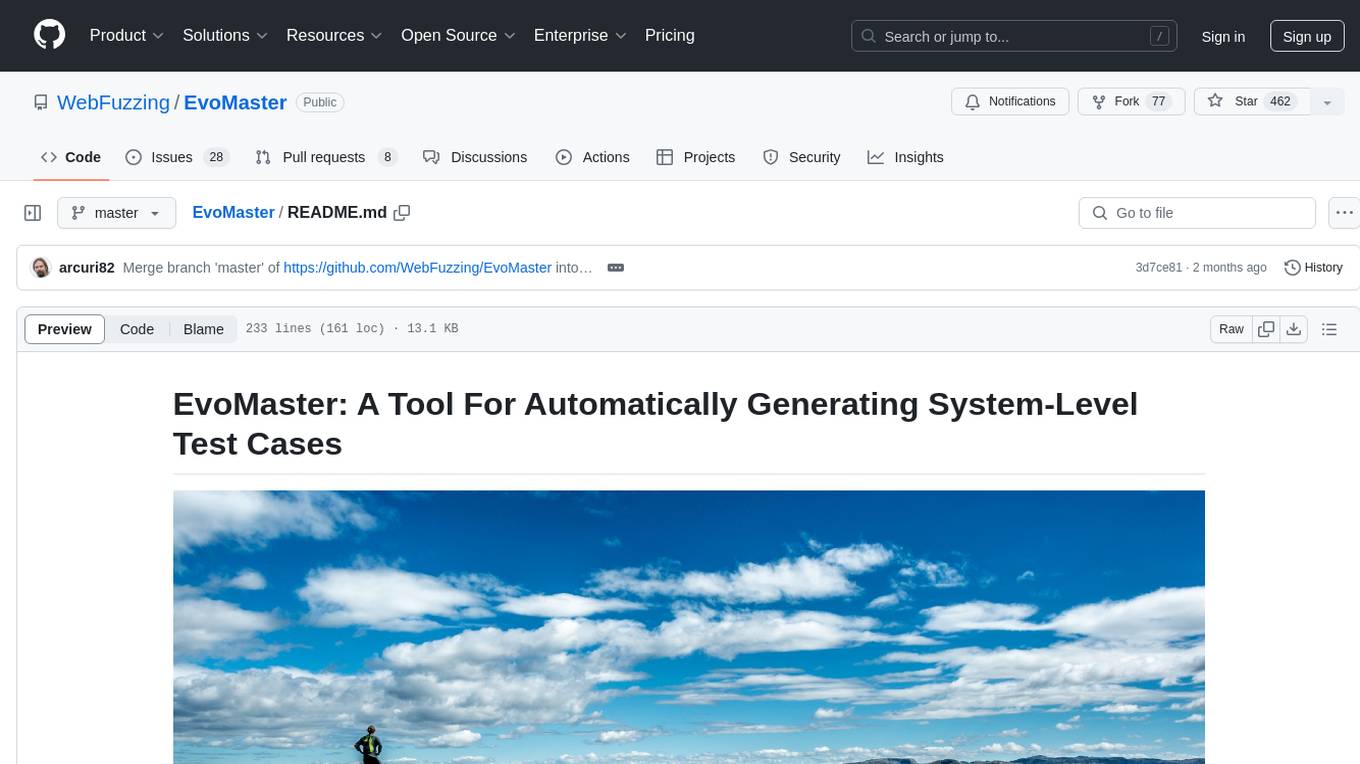
EvoMaster
EvoMaster is an open-source AI-driven tool that automatically generates system-level test cases for web/enterprise applications. It uses an Evolutionary Algorithm and Dynamic Program Analysis to evolve test cases, maximizing code coverage and fault detection. The tool supports REST, GraphQL, and RPC APIs, with whitebox testing for JVM-compiled languages. It generates JUnit tests, detects faults, handles SQL databases, and supports authentication. EvoMaster has been funded by the European Research Council and the Research Council of Norway.
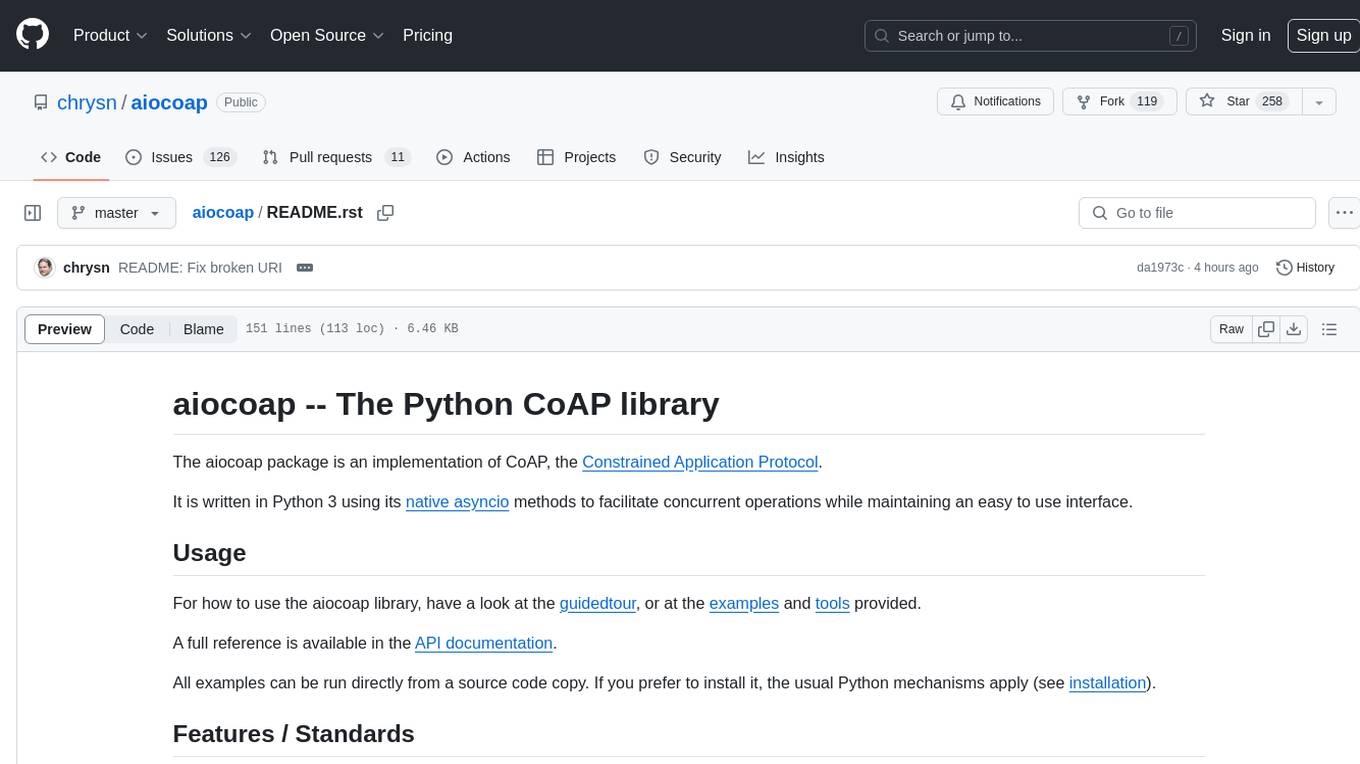
aiocoap
aiocoap is a Python library that implements the Constrained Application Protocol (CoAP) using native asyncio methods in Python 3. It supports various CoAP standards such as RFC7252, RFC7641, RFC7959, RFC8323, RFC7967, RFC8132, RFC9176, RFC8613, and draft-ietf-core-oscore-groupcomm-17. The library provides features for clients and servers, including multicast support, blockwise transfer, CoAP over TCP, TLS, and WebSockets, No-Response, PATCH/FETCH, OSCORE, and Group OSCORE. It offers an easy-to-use interface for concurrent operations and is suitable for IoT applications.
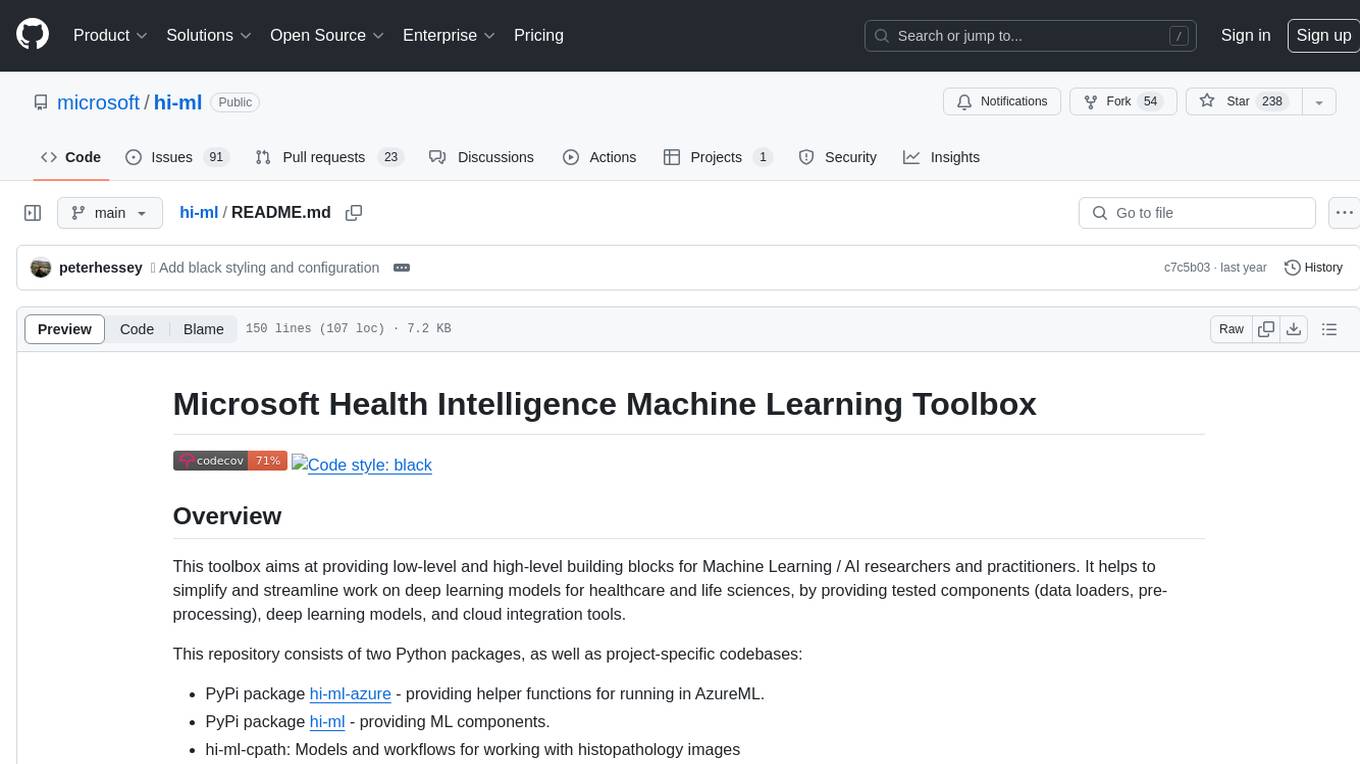
hi-ml
The Microsoft Health Intelligence Machine Learning Toolbox is a repository that provides low-level and high-level building blocks for Machine Learning / AI researchers and practitioners. It simplifies and streamlines work on deep learning models for healthcare and life sciences by offering tested components such as data loaders, pre-processing tools, deep learning models, and cloud integration utilities. The repository includes two Python packages, 'hi-ml-azure' for helper functions in AzureML, 'hi-ml' for ML components, and 'hi-ml-cpath' for models and workflows related to histopathology images.
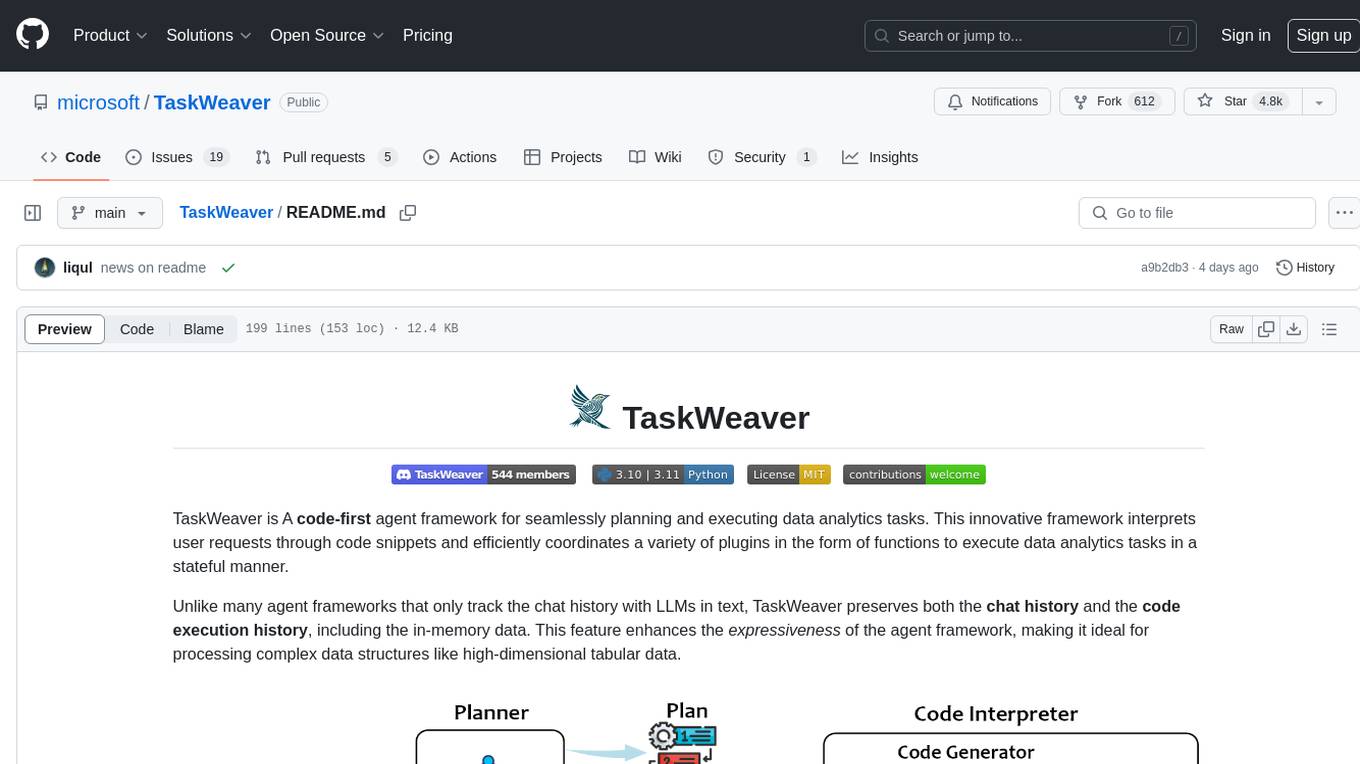
TaskWeaver
TaskWeaver is a code-first agent framework designed for planning and executing data analytics tasks. It interprets user requests through code snippets, coordinates various plugins to execute tasks in a stateful manner, and preserves both chat history and code execution history. It supports rich data structures, customized algorithms, domain-specific knowledge incorporation, stateful execution, code verification, easy debugging, security considerations, and easy extension. TaskWeaver is easy to use with CLI and WebUI support, and it can be integrated as a library. It offers detailed documentation, demo examples, and citation guidelines.
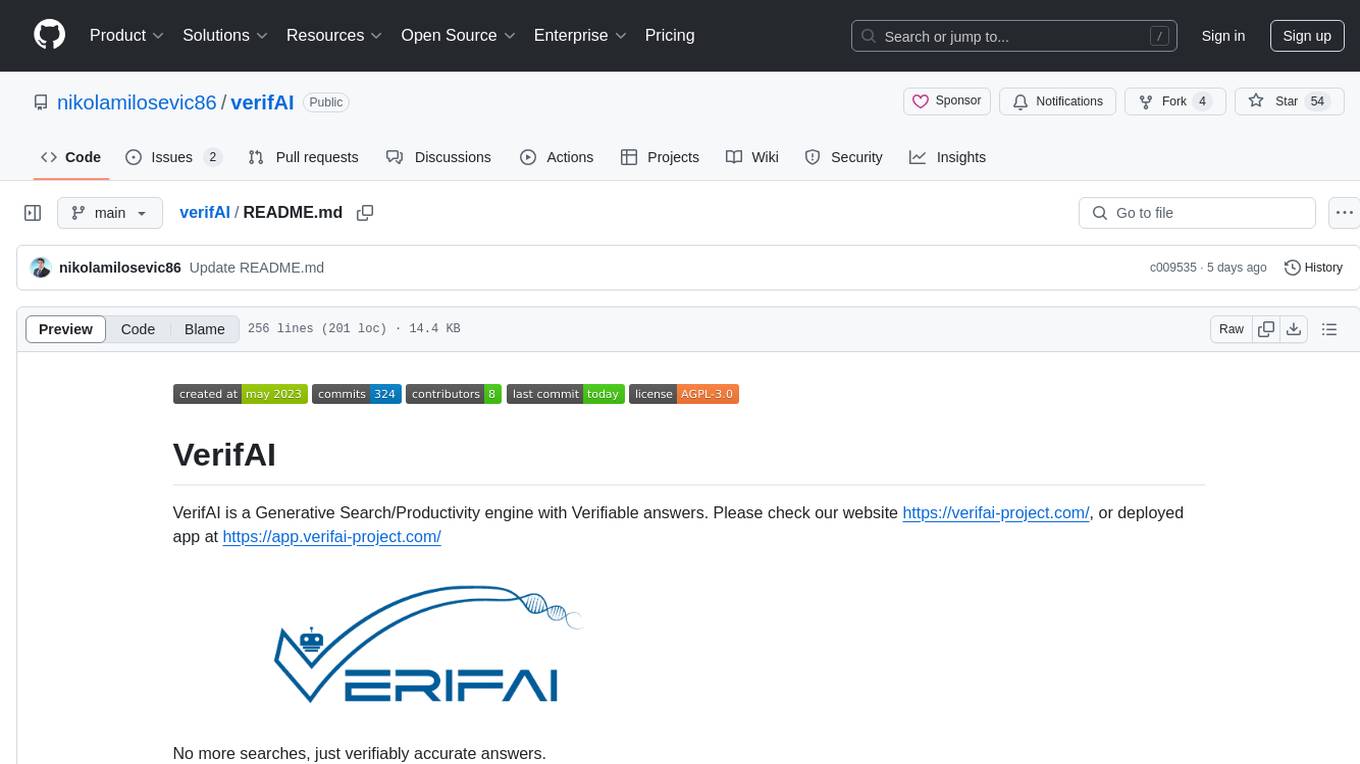
verifAI
VerifAI is a document-based question-answering system that addresses hallucinations in generative large language models and search engines. It retrieves relevant documents, generates answers with references, and verifies answers for accuracy. The engine uses generative search technology and a verification model to ensure no misinformation. VerifAI supports various document formats and offers user registration with a React.js interface. It is open-source and designed to be user-friendly, making it accessible for anyone to use.

project_alice
Alice is an agentic workflow framework that integrates task execution and intelligent chat capabilities. It provides a flexible environment for creating, managing, and deploying AI agents for various purposes, leveraging a microservices architecture with MongoDB for data persistence. The framework consists of components like APIs, agents, tasks, and chats that interact to produce outputs through files, messages, task results, and URL references. Users can create, test, and deploy agentic solutions in a human-language framework, making it easy to engage with by both users and agents. The tool offers an open-source option, user management, flexible model deployment, and programmatic access to tasks and chats.
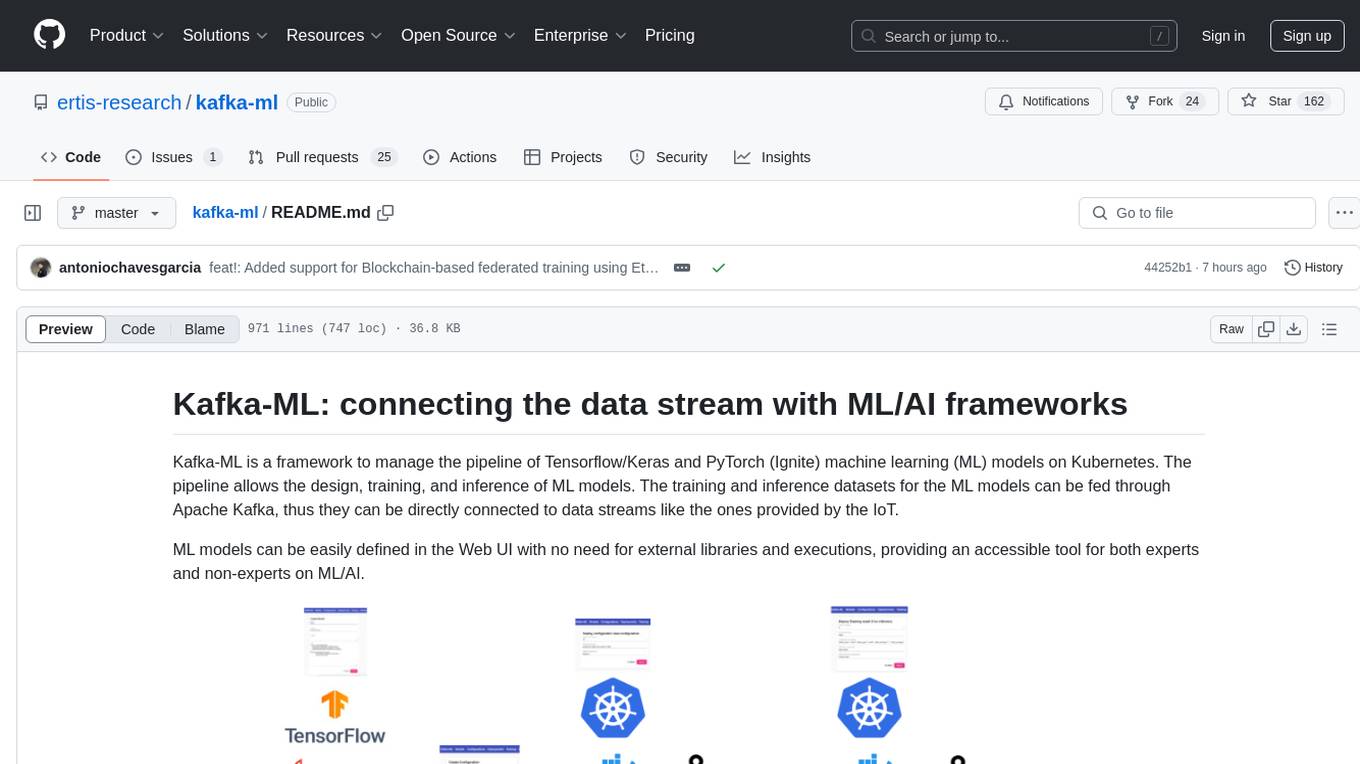
kafka-ml
Kafka-ML is a framework designed to manage the pipeline of Tensorflow/Keras and PyTorch machine learning models on Kubernetes. It enables the design, training, and inference of ML models with datasets fed through Apache Kafka, connecting them directly to data streams like those from IoT devices. The Web UI allows easy definition of ML models without external libraries, catering to both experts and non-experts in ML/AI.
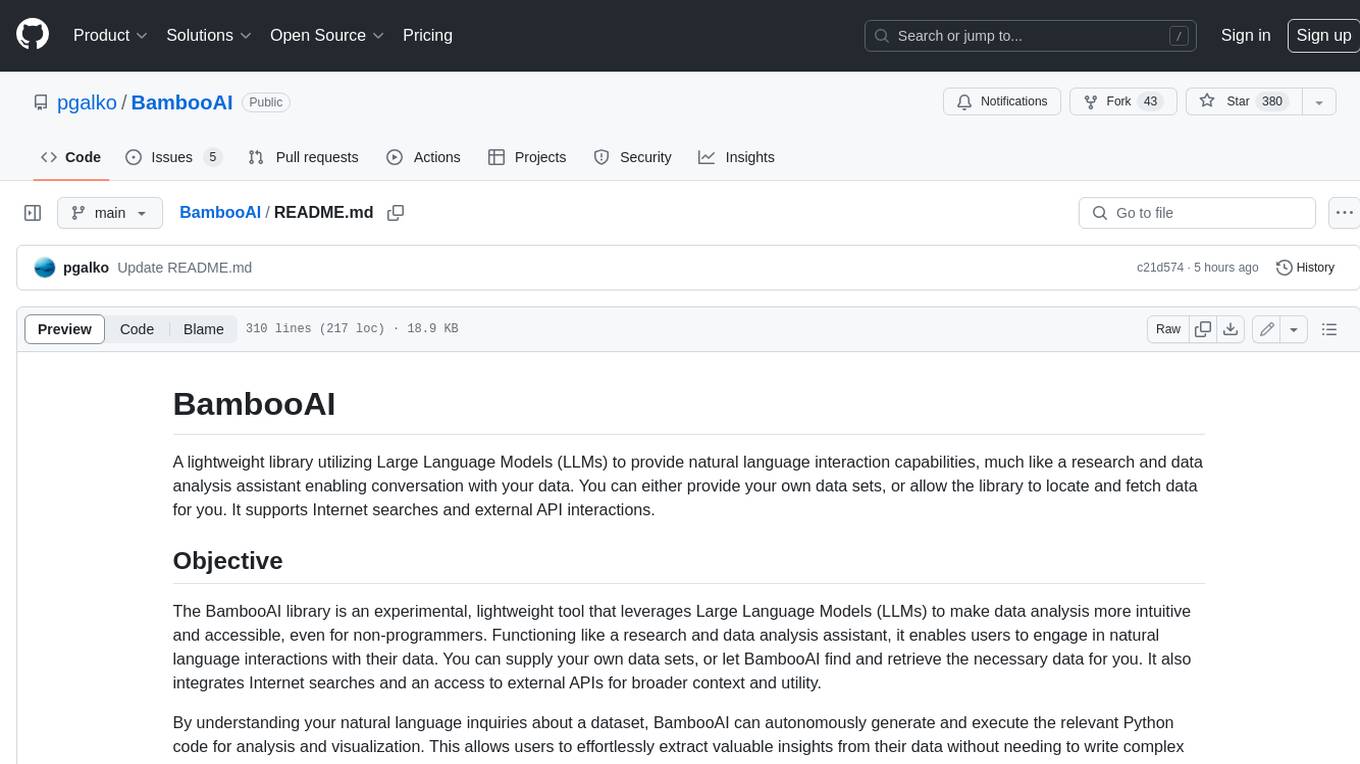
BambooAI
BambooAI is a lightweight library utilizing Large Language Models (LLMs) to provide natural language interaction capabilities, much like a research and data analysis assistant enabling conversation with your data. You can either provide your own data sets, or allow the library to locate and fetch data for you. It supports Internet searches and external API interactions.
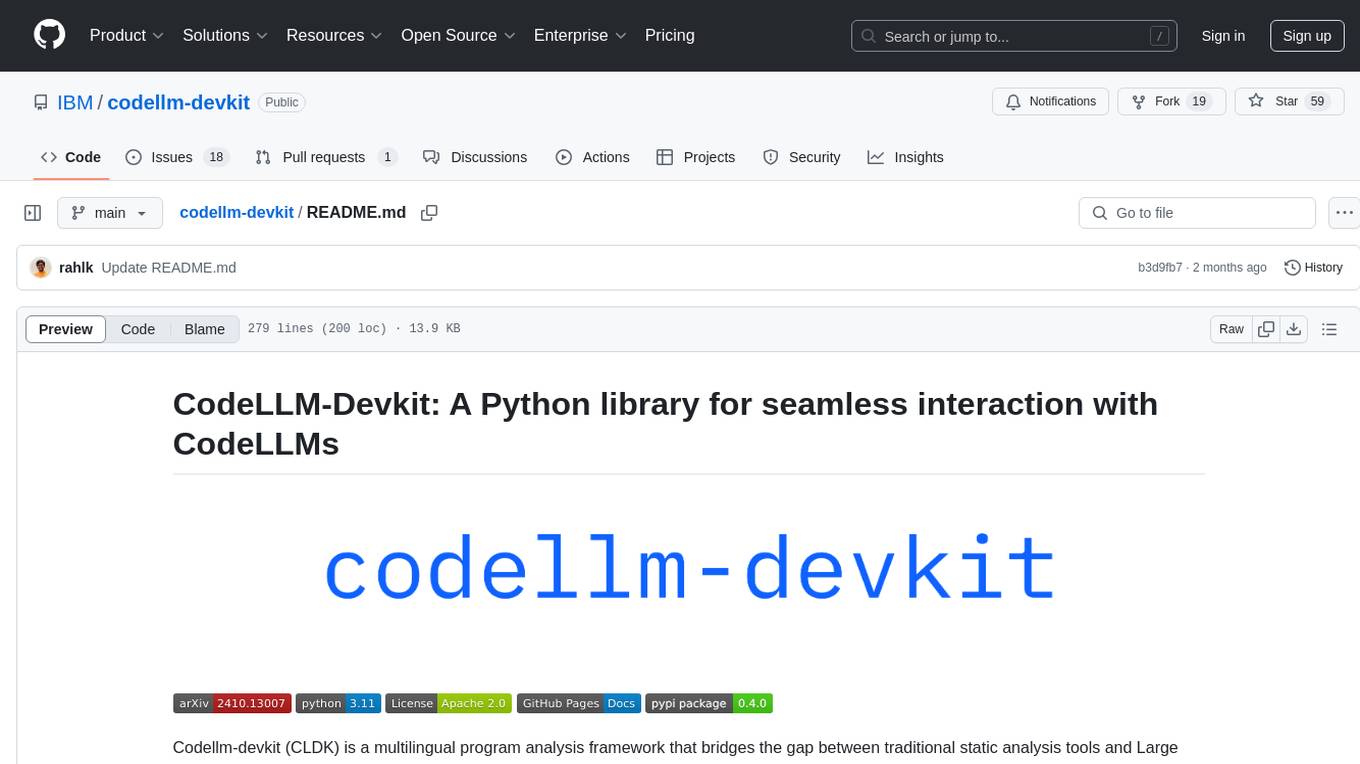
codellm-devkit
Codellm-devkit (CLDK) is a Python library that serves as a multilingual program analysis framework bridging traditional static analysis tools and Large Language Models (LLMs) specialized for code (CodeLLMs). It simplifies the process of analyzing codebases across multiple programming languages, enabling the extraction of meaningful insights and facilitating LLM-based code analysis. The library provides a unified interface for integrating outputs from various analysis tools and preparing them for effective use by CodeLLMs. Codellm-devkit aims to enable the development and experimentation of robust analysis pipelines that combine traditional program analysis tools and CodeLLMs, reducing friction in multi-language code analysis and ensuring compatibility across different tools and LLM platforms. It is designed to seamlessly integrate with popular analysis tools like WALA, Tree-sitter, LLVM, and CodeQL, acting as a crucial intermediary layer for efficient communication between these tools and CodeLLMs. The project is continuously evolving to include new tools and frameworks, maintaining its versatility for code analysis and LLM integration.

mosec
Mosec is a high-performance and flexible model serving framework for building ML model-enabled backend and microservices. It bridges the gap between any machine learning models you just trained and the efficient online service API. * **Highly performant** : web layer and task coordination built with Rust 🦀, which offers blazing speed in addition to efficient CPU utilization powered by async I/O * **Ease of use** : user interface purely in Python 🐍, by which users can serve their models in an ML framework-agnostic manner using the same code as they do for offline testing * **Dynamic batching** : aggregate requests from different users for batched inference and distribute results back * **Pipelined stages** : spawn multiple processes for pipelined stages to handle CPU/GPU/IO mixed workloads * **Cloud friendly** : designed to run in the cloud, with the model warmup, graceful shutdown, and Prometheus monitoring metrics, easily managed by Kubernetes or any container orchestration systems * **Do one thing well** : focus on the online serving part, users can pay attention to the model optimization and business logic
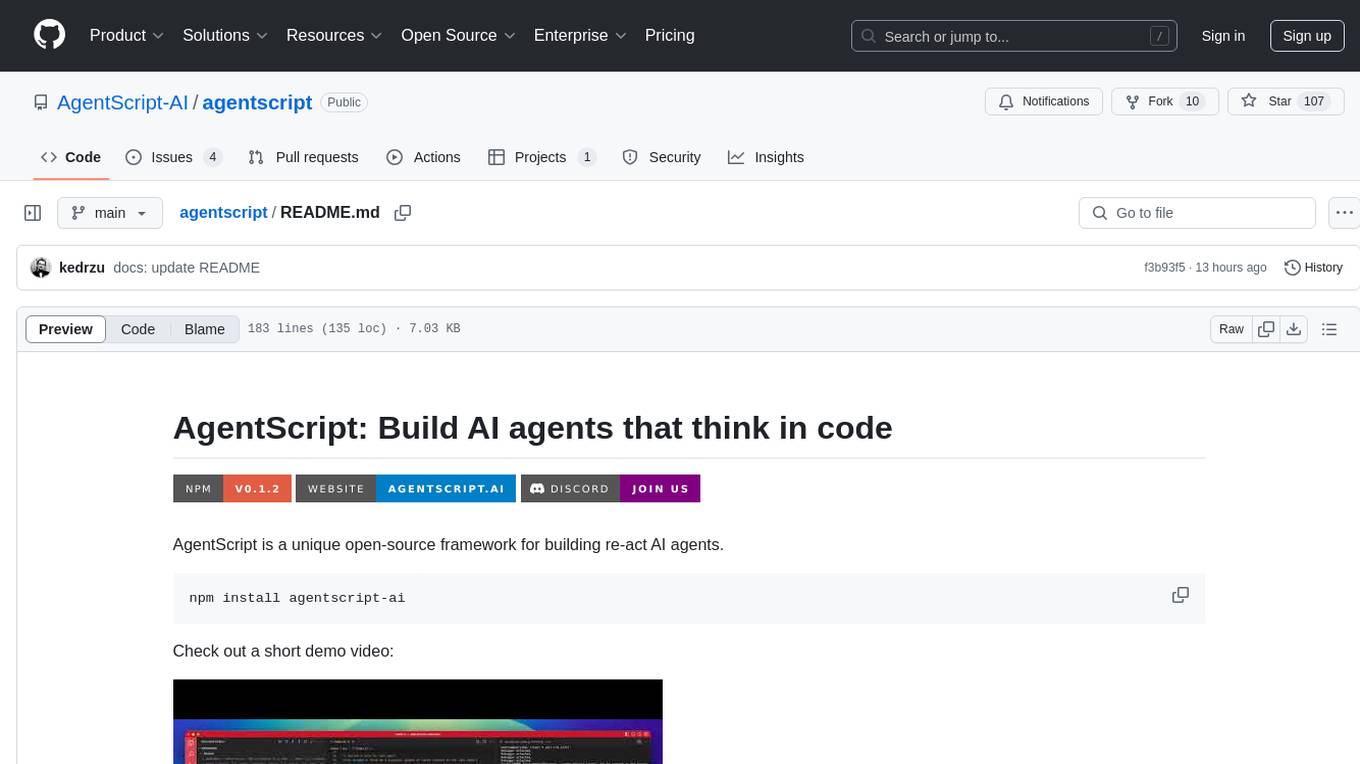
agentscript
AgentScript is an open-source framework for building AI agents that think in code. It prompts a language model to generate JavaScript code, which is then executed in a dedicated runtime with resumability, state persistence, and interactivity. The framework allows for abstract task execution without needing to know all the data beforehand, making it flexible and efficient. AgentScript supports tools, deterministic functions, and LLM-enabled functions, enabling dynamic data processing and decision-making. It also provides state management and human-in-the-loop capabilities, allowing for pausing, serialization, and resumption of execution.
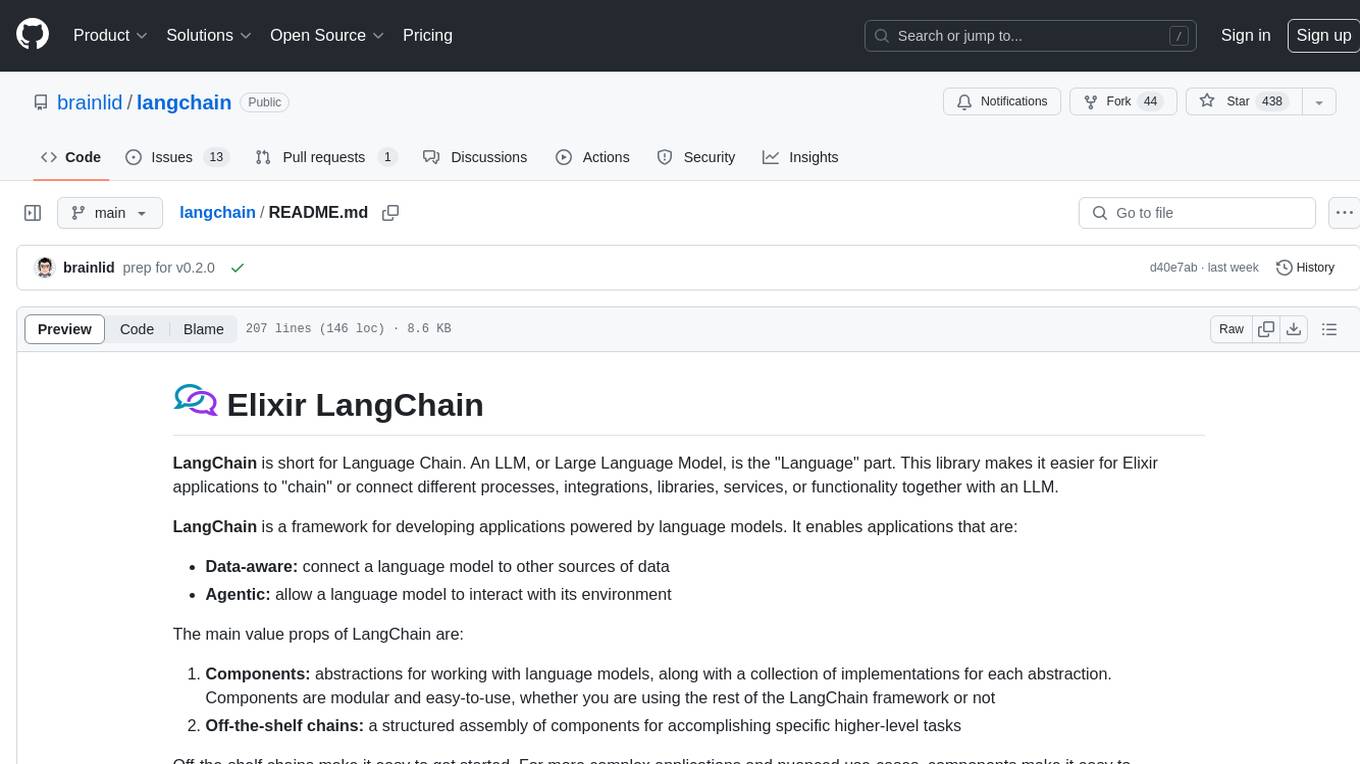
langchain
LangChain is a framework for developing Elixir applications powered by language models. It enables applications to connect language models to other data sources and interact with the environment. The library provides components for working with language models and off-the-shelf chains for specific tasks. It aims to assist in building applications that combine large language models with other sources of computation or knowledge. LangChain is written in Elixir and is not aimed for parity with the JavaScript and Python versions due to differences in programming paradigms and design choices. The library is designed to make it easy to integrate language models into applications and expose features, data, and functionality to the models.
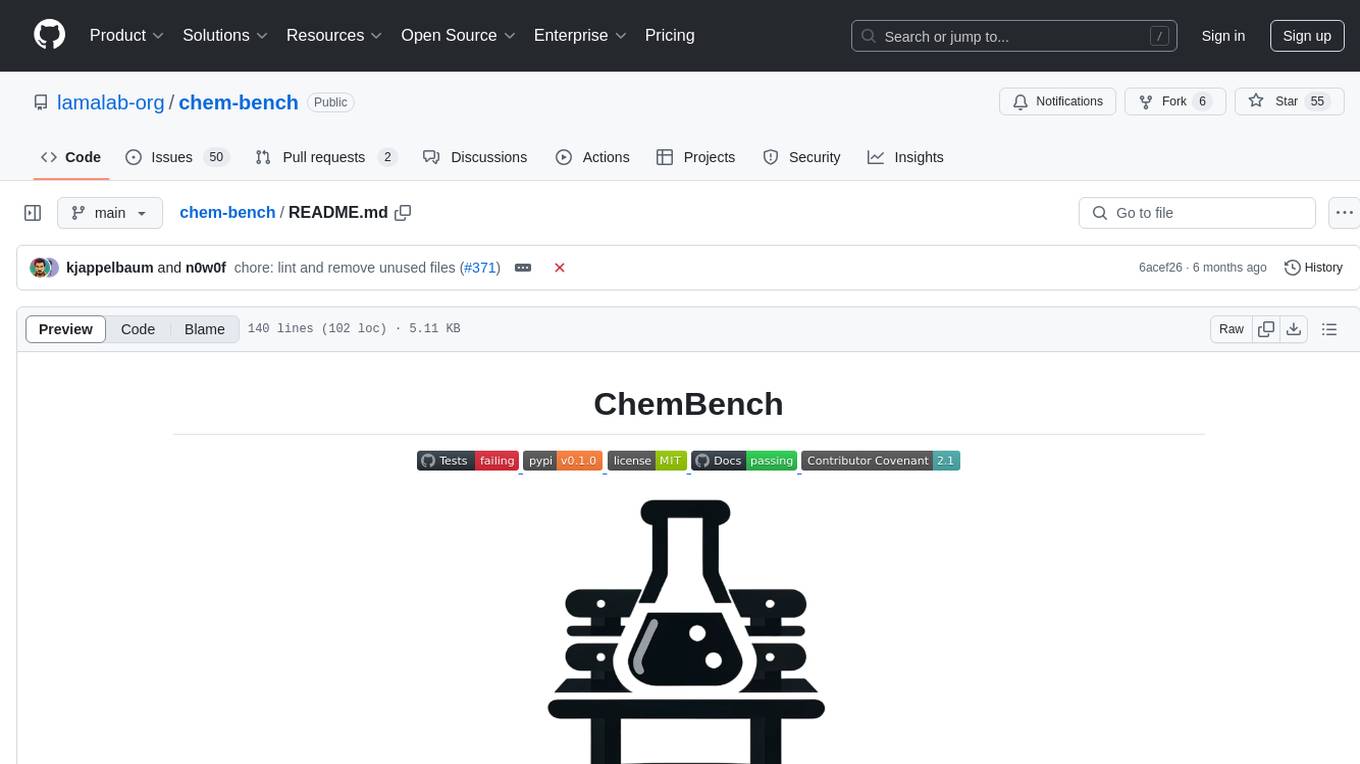
chem-bench
ChemBench is a project aimed at expanding chemistry benchmark tasks in a BIG-bench compatible way, providing a pipeline to benchmark frontier and open models. It allows users to run benchmarking tasks on models with existing presets, offering predefined parameters and processing steps. The library facilitates benchmarking models on the entire suite, addressing challenges such as prompt structure, parsing, and scoring methods. Users can contribute to the project by following the developer notes.

onnxruntime-genai
ONNX Runtime Generative AI is a library that provides the generative AI loop for ONNX models, including inference with ONNX Runtime, logits processing, search and sampling, and KV cache management. Users can call a high level `generate()` method, or run each iteration of the model in a loop. It supports greedy/beam search and TopP, TopK sampling to generate token sequences, has built in logits processing like repetition penalties, and allows for easy custom scoring.
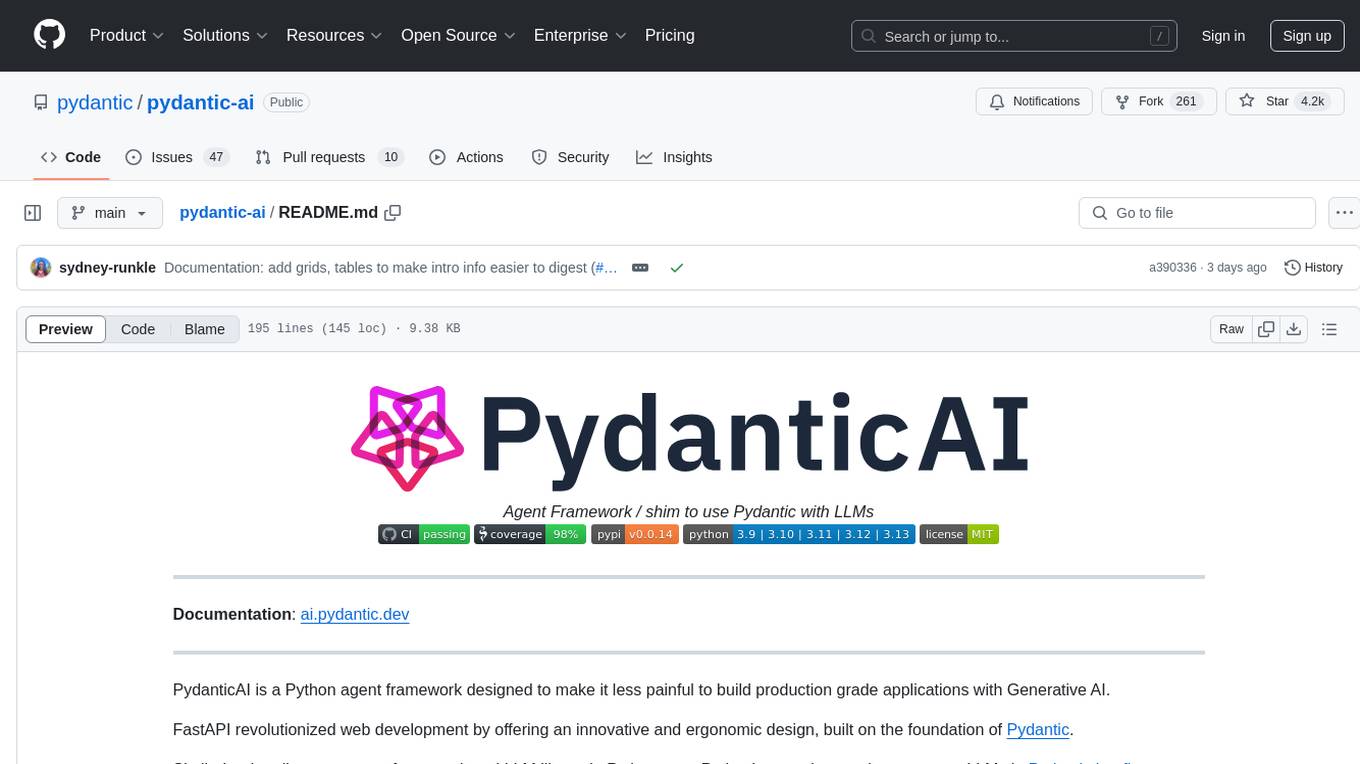
pydantic-ai
PydanticAI is a Python agent framework designed to make it less painful to build production grade applications with Generative AI. It is built by the Pydantic Team and supports various AI models like OpenAI, Anthropic, Gemini, Ollama, Groq, and Mistral. PydanticAI seamlessly integrates with Pydantic Logfire for real-time debugging, performance monitoring, and behavior tracking of LLM-powered applications. It is type-safe, Python-centric, and offers structured responses, dependency injection system, and streamed responses. PydanticAI is in early beta, offering a Python-centric design to apply standard Python best practices in AI-driven projects.
For similar tasks

gcloud-aio
This repository contains shared codebase for two projects: gcloud-aio and gcloud-rest. gcloud-aio is built for Python 3's asyncio, while gcloud-rest is a threadsafe requests-based implementation. It provides clients for Google Cloud services like Auth, BigQuery, Datastore, KMS, PubSub, Storage, and Task Queue. Users can install the library using pip and refer to the documentation for usage details. Developers can contribute to the project by following the contribution guide.
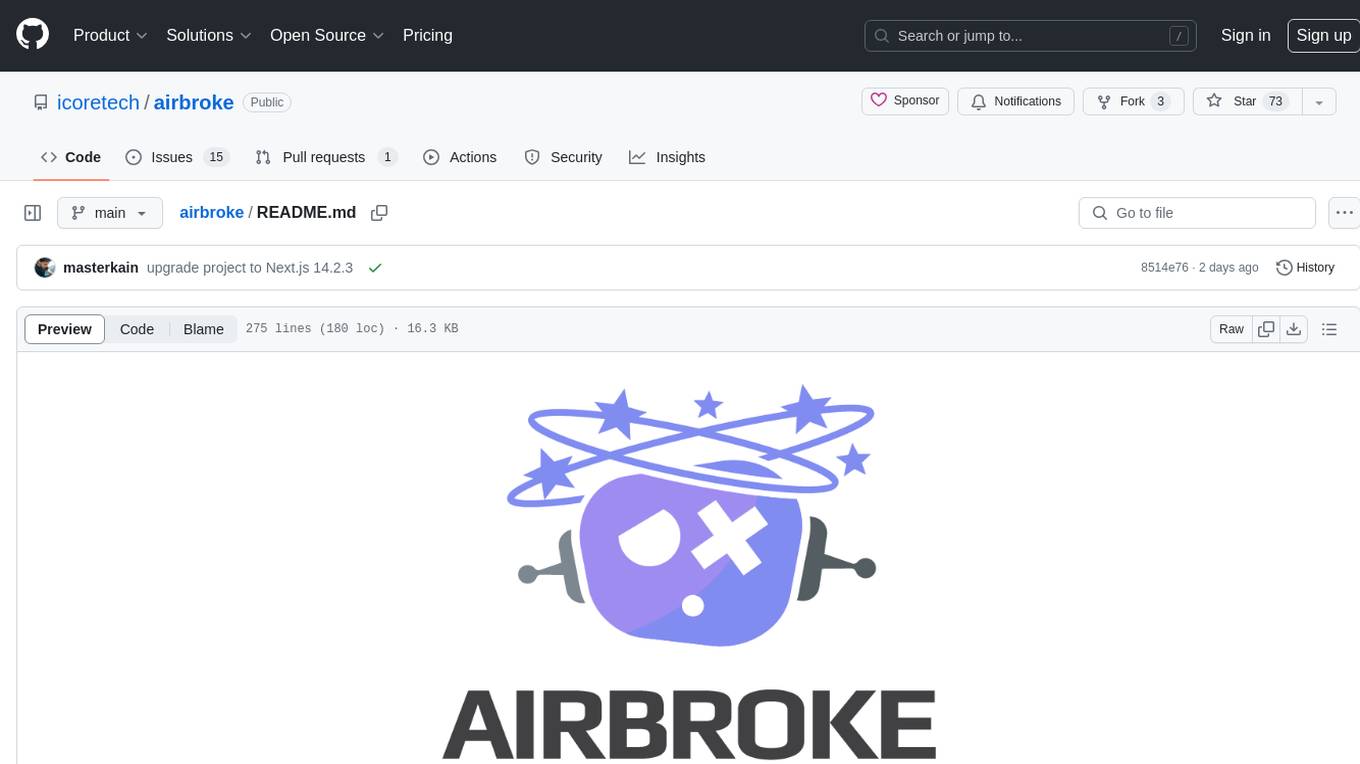
airbroke
Airbroke is an open-source error catcher tool designed for modern web applications. It provides a PostgreSQL-based backend with an Airbrake-compatible HTTP collector endpoint and a React-based frontend for error management. The tool focuses on simplicity, maintaining a small database footprint even under heavy data ingestion. Users can ask AI about issues, replay HTTP exceptions, and save/manage bookmarks for important occurrences. Airbroke supports multiple OAuth providers for secure user authentication and offers occurrence charts for better insights into error occurrences. The tool can be deployed in various ways, including building from source, using Docker images, deploying on Vercel, Render.com, Kubernetes with Helm, or Docker Compose. It requires Node.js, PostgreSQL, and specific system resources for deployment.
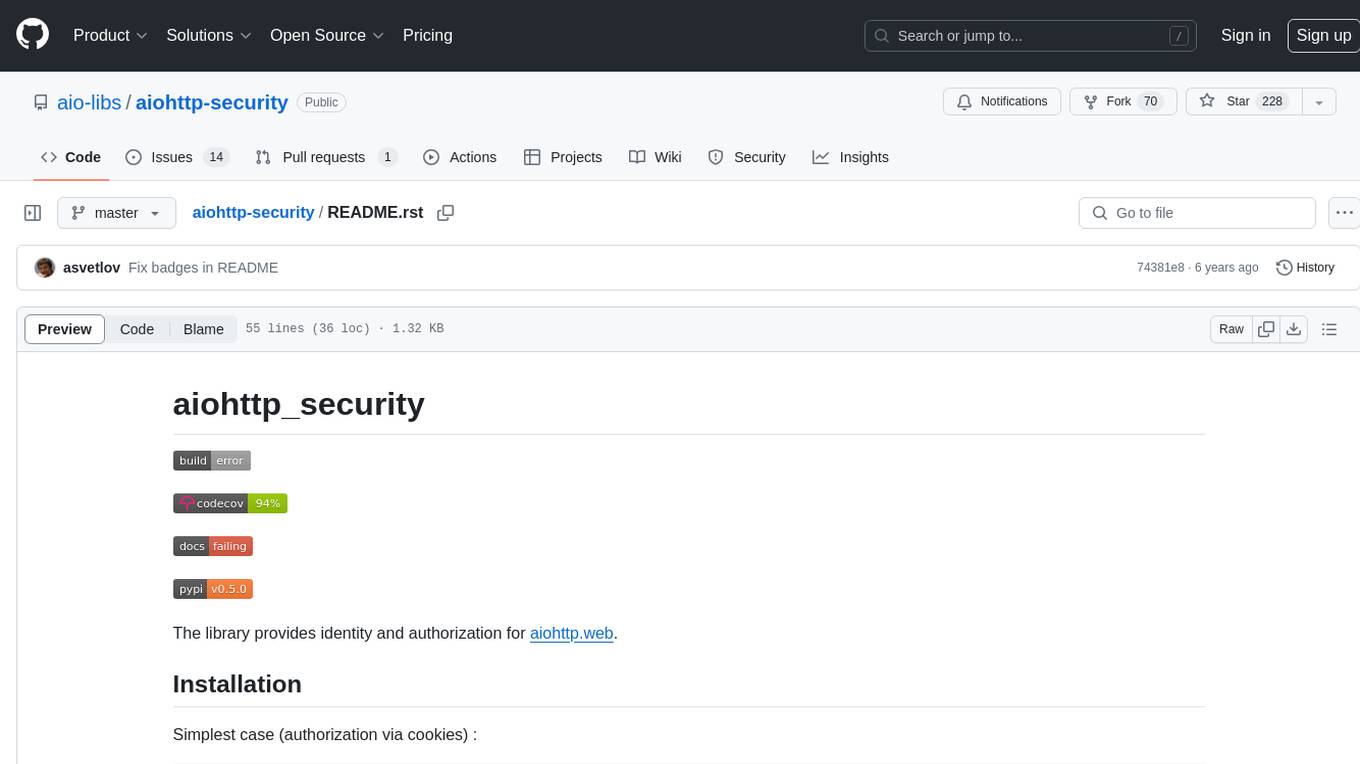
aiohttp-security
aiohttp_security is a library that provides identity and authorization for aiohttp.web. It offers features for handling authorization via cookies and supports aiohttp-session. The library includes examples for basic usage and database authentication, along with demos in the demo directory. For development, the library requires installation of specific requirements listed in the requirements-dev.txt file. aiohttp_security is licensed under the Apache 2 license.

EvoMaster
EvoMaster is an open-source AI-driven tool that automatically generates system-level test cases for web/enterprise applications. It uses Evolutionary Algorithm and Dynamic Program Analysis to evolve test cases, maximizing code coverage and fault detection. It supports REST, GraphQL, and RPC APIs, with whitebox testing for JVM-compiled APIs. The tool generates JUnit tests in Java or Kotlin, focusing on fault detection, self-contained tests, SQL handling, and authentication. Known limitations include manual driver creation for whitebox testing and longer execution times for better results. EvoMaster has been funded by ERC and RCN grants.
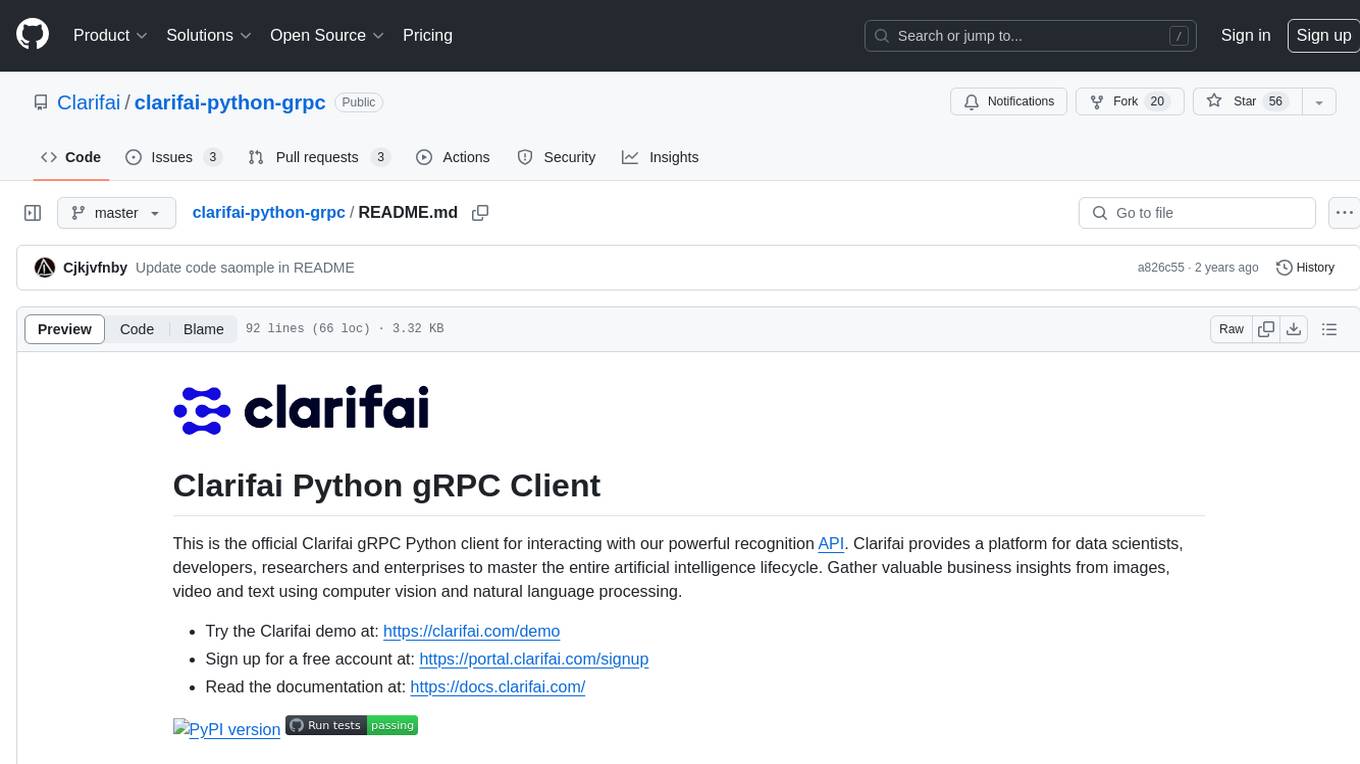
clarifai-python-grpc
This is the official Clarifai gRPC Python client for interacting with their recognition API. Clarifai offers a platform for data scientists, developers, researchers, and enterprises to utilize artificial intelligence for image, video, and text analysis through computer vision and natural language processing. The client allows users to authenticate, predict concepts in images, and access various functionalities provided by the Clarifai API. It follows a versioning scheme that aligns with the backend API updates and includes specific instructions for installation and troubleshooting. Users can explore the Clarifai demo, sign up for an account, and refer to the documentation for detailed information.
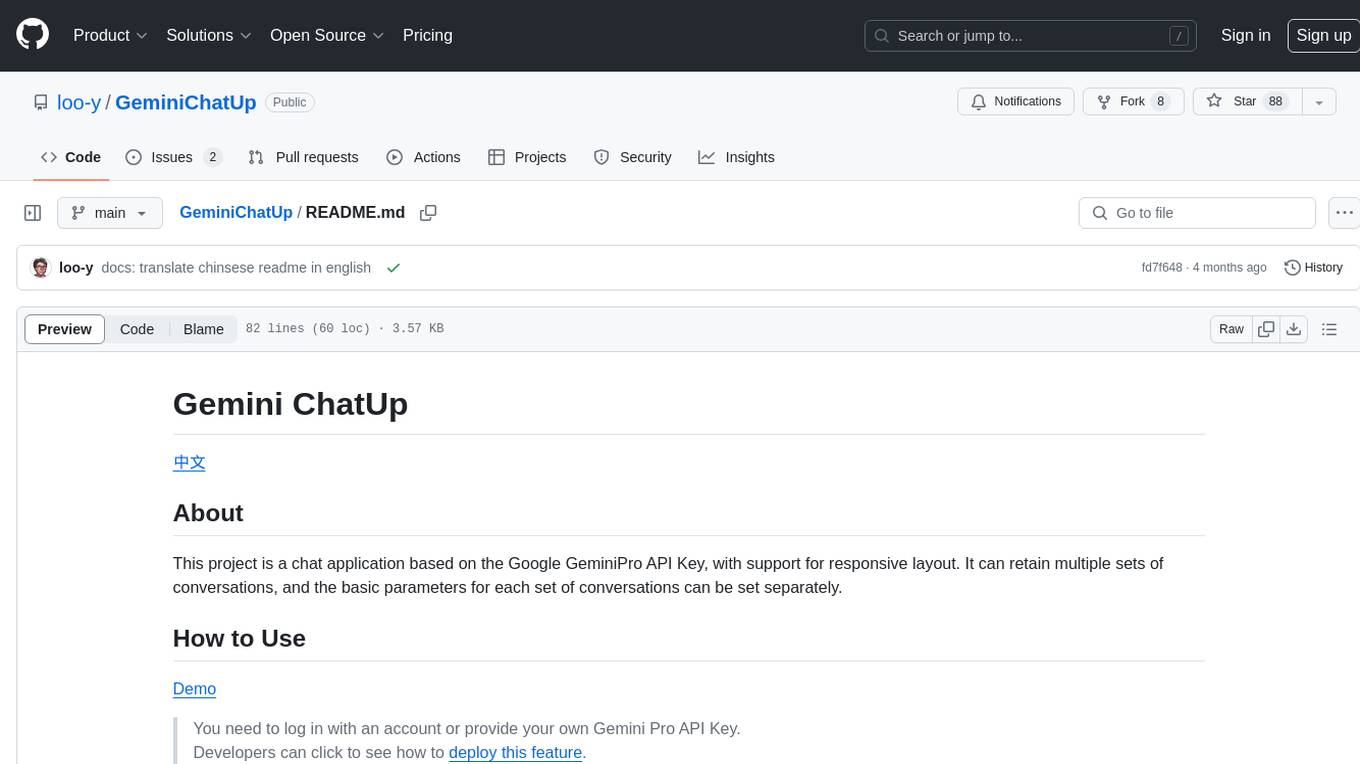
GeminiChatUp
Gemini ChatUp is a chat application utilizing the Google GeminiPro API Key. It supports responsive layout and can store multiple sets of conversations with customizable parameters for each set. Users can log in with a test account or provide their own API Key to deploy the feature. The application also offers user authentication through Edge config in Vercel, allowing users to add usernames and passwords in JSON format. Local deployment is possible by installing dependencies, setting up environment variables, and running the application locally.
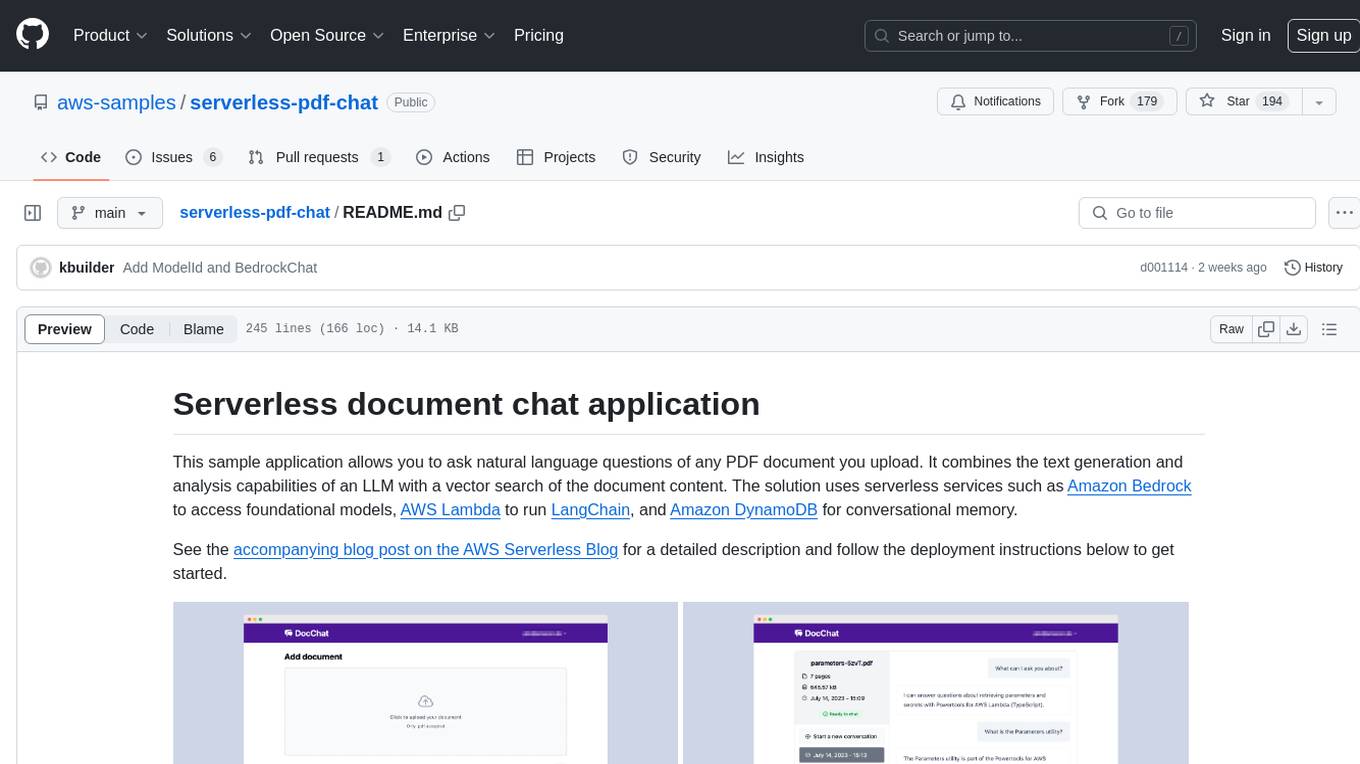
serverless-pdf-chat
The serverless-pdf-chat repository contains a sample application that allows users to ask natural language questions of any PDF document they upload. It leverages serverless services like Amazon Bedrock, AWS Lambda, and Amazon DynamoDB to provide text generation and analysis capabilities. The application architecture involves uploading a PDF document to an S3 bucket, extracting metadata, converting text to vectors, and using a LangChain to search for information related to user prompts. The application is not intended for production use and serves as a demonstration and educational tool.
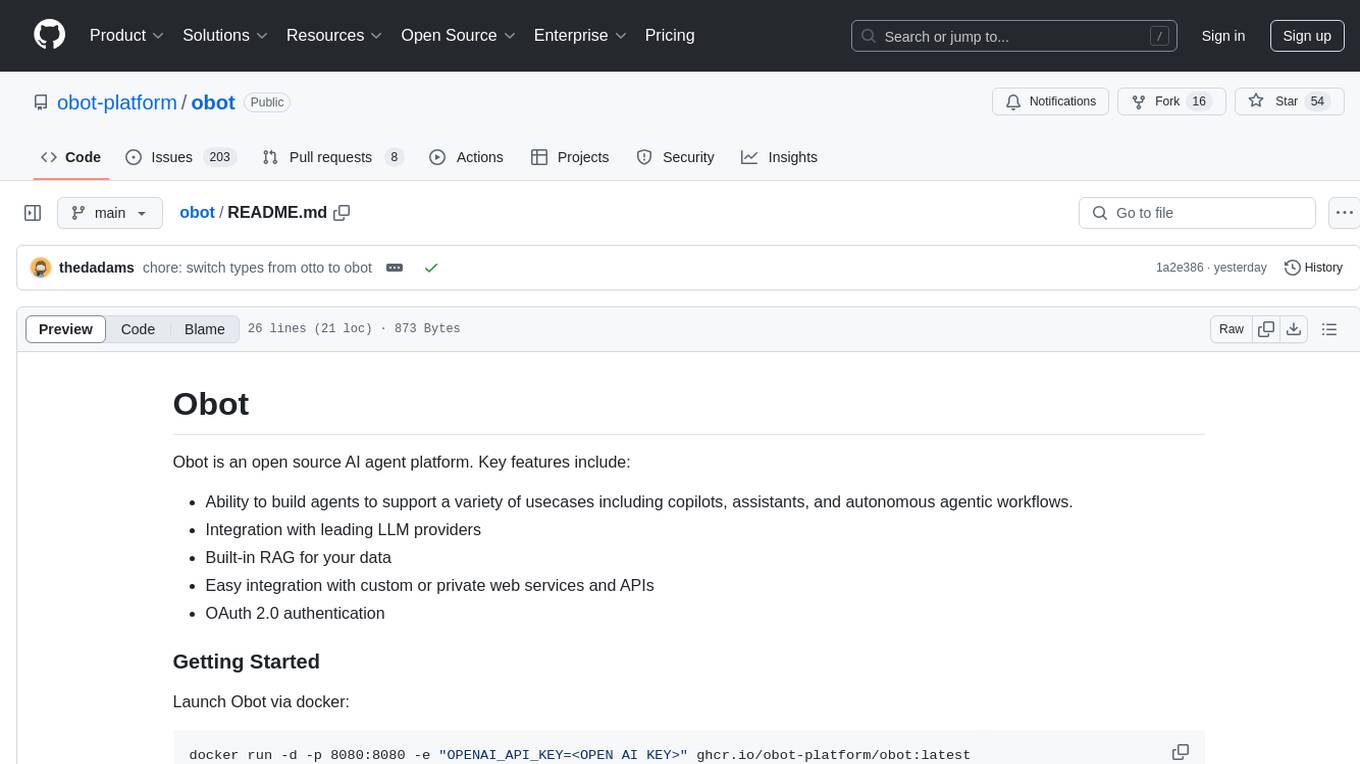
obot
Obot is an open source AI agent platform that allows users to build agents for various use cases such as copilots, assistants, and autonomous workflows. It offers integration with leading LLM providers, built-in RAG for data, easy integration with custom web services and APIs, and OAuth 2.0 authentication.
For similar jobs

weave
Weave is a toolkit for developing Generative AI applications, built by Weights & Biases. With Weave, you can log and debug language model inputs, outputs, and traces; build rigorous, apples-to-apples evaluations for language model use cases; and organize all the information generated across the LLM workflow, from experimentation to evaluations to production. Weave aims to bring rigor, best-practices, and composability to the inherently experimental process of developing Generative AI software, without introducing cognitive overhead.

LLMStack
LLMStack is a no-code platform for building generative AI agents, workflows, and chatbots. It allows users to connect their own data, internal tools, and GPT-powered models without any coding experience. LLMStack can be deployed to the cloud or on-premise and can be accessed via HTTP API or triggered from Slack or Discord.

VisionCraft
The VisionCraft API is a free API for using over 100 different AI models. From images to sound.

kaito
Kaito is an operator that automates the AI/ML inference model deployment in a Kubernetes cluster. It manages large model files using container images, avoids tuning deployment parameters to fit GPU hardware by providing preset configurations, auto-provisions GPU nodes based on model requirements, and hosts large model images in the public Microsoft Container Registry (MCR) if the license allows. Using Kaito, the workflow of onboarding large AI inference models in Kubernetes is largely simplified.

PyRIT
PyRIT is an open access automation framework designed to empower security professionals and ML engineers to red team foundation models and their applications. It automates AI Red Teaming tasks to allow operators to focus on more complicated and time-consuming tasks and can also identify security harms such as misuse (e.g., malware generation, jailbreaking), and privacy harms (e.g., identity theft). The goal is to allow researchers to have a baseline of how well their model and entire inference pipeline is doing against different harm categories and to be able to compare that baseline to future iterations of their model. This allows them to have empirical data on how well their model is doing today, and detect any degradation of performance based on future improvements.

tabby
Tabby is a self-hosted AI coding assistant, offering an open-source and on-premises alternative to GitHub Copilot. It boasts several key features: * Self-contained, with no need for a DBMS or cloud service. * OpenAPI interface, easy to integrate with existing infrastructure (e.g Cloud IDE). * Supports consumer-grade GPUs.

spear
SPEAR (Simulator for Photorealistic Embodied AI Research) is a powerful tool for training embodied agents. It features 300 unique virtual indoor environments with 2,566 unique rooms and 17,234 unique objects that can be manipulated individually. Each environment is designed by a professional artist and features detailed geometry, photorealistic materials, and a unique floor plan and object layout. SPEAR is implemented as Unreal Engine assets and provides an OpenAI Gym interface for interacting with the environments via Python.

Magick
Magick is a groundbreaking visual AIDE (Artificial Intelligence Development Environment) for no-code data pipelines and multimodal agents. Magick can connect to other services and comes with nodes and templates well-suited for intelligent agents, chatbots, complex reasoning systems and realistic characters.




